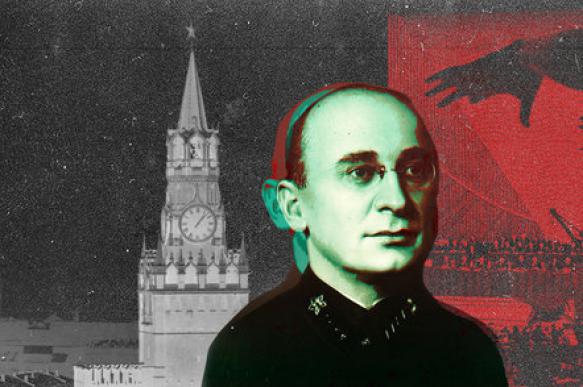Lavrenty Beria: The murderer, who built USSR's nuclear bomb
Lavrenty Beria, along with Henry Yagoda and Nikolai Yezhov, are known as main executioners of the Stalinist regime. He continued mass shootings and deportations and was known for his cruelty. Still, many people share mixed attitude to his persona even today.

Admitting to his crimes, Beria's defenders call him "a talented manager" who had achieved a lot and had done a lot for the country.
Beria began his activity as a People's Commissar for Internal Affairs of the USSR by announcing amnesty. About 200,000 people, arrested under Yezhov on trumped-up charges as "enemies of the people," were released.
Most likely, the amnesty was not an initiative of the new People's Commissar - Stalin understood that Yezhov had gone too far when executing his instructions. One had to show the people that there was justice in the country. The decision earned Beria the image of the defender of lawfulness.
He reorganised the work of the foreign intelligence of the USSR. Prior to the war, Beria assisted in the creation of an extensive network of agents. With the help of its agents in foreign countries, the Soviet Union received information about new technological developments, such as the work of the United States on the atomic bomb.
After WWII, in 1945, Beria was awarded the rank of a marshal of the Soviet Union for his merits in the Great Patriotic War. On June 30, 1940, he became a member of the State Defence Committee. Beria supervised the production of military hardware, the work of the People's Commissariat of the Coal Industry and the People's Commissariat of Railways.
Communications required to evacuate important enterprises and their employees to the rear were created as quickly as possible. As many as 3,570 kilometres of railways, 4200 kilometres of roads, and 842 aerodromes were built. Following the evacuation, factories started producing tanks, airplanes, ammunition, etc and began introducing new models of arms within shortest periods of time possible.
From 1942 to 1944 years, the Soviet Union was producing an average of 2,000 tanks and self-propelled artillery systems every month. Annually, up to 450,000 machine guns were produced, whereas in Germany the number was 250,000.
The USSR started experimenting with uranium long before the war. During the war, intelligence reported about nuclear projects in the US and England. Beria started informing Kurchatov, the scientific leader of the Special Committee of the GKO. A special laboratory was created. On December 3, 1944, Stalin signed an order "to entrust Comrade Beria with the work to supervise the development of uranium exploration activities."
After the bombings of Hiroshima and Nagasaki, the USSR paid more attention to the work on the atomic bomb. Kurchatov admitted: "If it wasn't for Beria, we would not have made the bomb." Beria ordered to register all physicists of the country: there were 4,212 of them. The country urgently needed nuclear specialists, and the Soviet Union started training them.
In 1945, Soviet intelligence services obtained a book about the creation of the atomic bomb in the United States. Beria established a regime of absolute secrecy around the whole project and ordered to employ all nuclear specialists, even if they were imprisoned in gulags. He thus saved the lives of many scientists who would have died in camps otherwise.
The nuclear bomb was created and tested in 1949. A few years later, Sakharov created a thermonuclear (hydrogen) bomb. It was tested after Beria was arrested.
After Stalin's death, Beria saw himself as the next leader of the USSR. Malenkov became the official head of the Soviet government, and Beria took the post of the first deputy chairman of the Council of Ministers.
He probably remembered the effect of the amnesty that he had announced in the 1930s, and closed many cases on which many people were going to be arrested. At his suggestion, the Presidium of the Central Committee of the CPSU approved the decree "On Amnesty" on March 27, 1953. Over one million people were released under the law.
In the "Draft Decree of the Council of Ministers of the USSR," which Beria submitted to Malenkov on May 13, 1953, he proposed abolishing passport restrictions on residence that prevented those who had served their sentence from returning home and finding a decent job.
The document stated: "Under the present situation, the citizens who have served their sentences in places of detention or exile and who have thus redeemed their guilt before the society continue to experience hardship."
The proposal was accepted, and restrictions on residence in more than 300 cities and regions of the USSR were abolished.
Beria advocated the abolition of the 1952 policy for the "intensified construction of socialism," restrictions on small and medium-sized private capital, and the instilment of agricultural cooperatives (a variant of collectivisation). The proposal was approved by the Presidium of the CPSU Central Committee; only Malenkov was against it.
At the same time, Beria remained the man behind a multitude of deaths. In our times, attempts were made to rehabilitate his name, but the Military Collegium of the Supreme Court of the Russian Federation made a negative decision on the subject in May 2002 stating that Beria and his associates were among the leaders who "organised and personally conducted mass repressions against their own people on a state level."
Subscribe to Pravda.Ru Telegram channel, Facebook, RSS!


